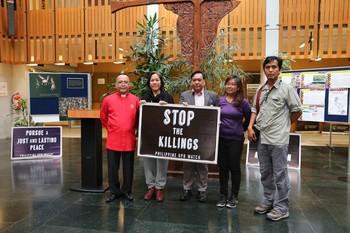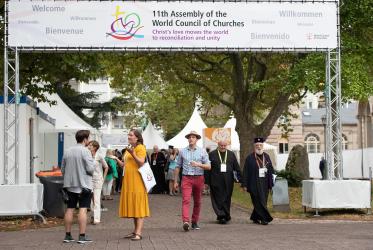The Philippines has long been noticed for crimes committed against its people, but now human rights violations of the government of President Roderigo Duterte are coming under scrutiny at the Human Rights Council after submissions made by church-backed civil society groups.
“Continuing assaults on people’s rights indicate the urgency for just and lasting peace in the Philippines,” said Karapatan Deputy Secretary General Jigs Clamor, in a press briefing of human rights defenders before the council began in May.
He spoke at the press briefing as the groups were set to participate in the Universal Periodic Review (UPR) of the Philippines at the United Nations Human Rights Council (UNHRC) in Geneva, Switzerland on 8 May, 2017.
“There is a need to make the Benigno Aquino III regime accountable for the crimes it has committed against the people, while pursuing the call for the Duterte government to stop dismissing and start addressing issues on rights violations and the roots of the armed conflict in the Philippines,” said Clamor.
The UPR is a mechanism of the Human Rights Council which was established by UN General Assembly resolution in 2006.
It periodically examines the human rights performance of all 193 UN Member States and is intended to complement, not duplicate, the work of other human rights mechanisms, including the human rights treaty bodies.
It is the first international human rights mechanism to address all countries and all human rights, and five people involved with Philippine UPR Watch spoke at the Ecumenical Centre in Geneva on 9 May.
Karapatan and Front Line Defenders, which works worldwide on the security and protection of human rights defenders at risk, released a statement on the Philippines on 16 May on the recent Philippines UPR.
“Continuing assaults on people’s rights indicate the urgency for just and lasting peace in the Philippines,” it said.
In a recent letter to the UN Special Rapporteur on human rights defenders, Karapatan noted that 474 human rights defenders were killed during the Arroyo presidency, from 2001-2010; 139 during the Aquino presidency from 2010-2016; while 33 have been killed since President Duterte came to power in July 2016 giving a total of 646 killed in a 16-year period.
Church groups in UPR Watch
Numerous church groups are members of the UPR Watch including the National Council of Churches of the Philippines (NCCP), the United Church of Christ in the Philippines (UCCP), Rural Missionaries of the Philippines (RMP) and the Association of Major Women Religious Superiors of the Philippines.
The Philippines came under scrutiny on 8 May 2017 during the 27th session of the UPR by the Human Rights Council in Geneva.
After the initial review of the national report submitted by the Philippines, member states of the UNHRC made their recommendations.
During the previous UPR of the Philippines in 2012, only four countries had raised concerns with regard to the situation of human rights defenders (HRDs) in the Philippines, resulting in five official recommendations.
In contrast, in its 2017 review, 11 States called for the establishment of protection mechanisms for HRDs and recommended that the Philippines “should provide a safe and enabling environment for the work of human rights defenders”.
Clamor also elucidated the key social indicators in the Philippines explaining it has one of the worst unemployment rates in Asia and a minimum wage of 491 pesos a day (around 10 Swiss francs or US$10) at the Ecumenical Centre meeting.
But, he pointed out, individuals require more than 1,000 pesos a day to attain a decent standard of living and 66 million Filipinos struggle on 125 pesos - just US$3 – a day, against a backdrop of an economy in which prices are increasing.
These have triggered street protests and have had a marked impact on human rights, the police response having martial-law style human rights violations.
Between July 2016 and January 2017, he said there were 23 extra- judicial killings with 387 political prisoners in the country, 283 of whom were held under the previous administration of President Aquino.
Since the beginning of 2012, there have been 249 extra judicial killing victims, 244 victims of torture, 17 victims of enforced disappearances and 103,337 forced evacuations due to military operations.
Attorney Ephraim Cortez the representative of the National Union of People’s Lawyers told the UPR that following the start of killings in 2001, one activist has been killed each day.
Assistance of the United States
He stressed that counter-insurgency actions by the government make no distinction between those engaged in an armed struggle and those not, observing that these actions could not have taken place without the assistance of the U.S. government.
He said U.S. troops in have been deployed in the Philippines as a counterweight to Chinese regional power and asserted that as a result, the U.S. government has committed war crimes and crimes against humanity.
Sharon Cabusao of the group called GABRIELA advocating on women’s issues spoke about 10 points on the Social Economic Agenda outlined in the government's submission.
Economic figures show growth figures, but these do not create jobs, she said, asserting the government works in favour of big business and multinationals, keeping people, especially women, in poverty.
Moreover, basic services and utilities for people are inaccessible. The report claims achievements in the sphere of women's health, but the only maternity hospital that provides free services for women is about to be privatized.
Each government agency was also supposed to put 5 percent of their budgets aside for gender issues, but this has not materialized.
There have also been severe military human rights violations against women including documented cases of rapes and group rapes by the military, but with no prosecutions resulting, said Cabusao.
Rather, she said, several military and police officials responsible for human rights violations have been promoted.
Nardy Sabino of the Promotion of Church People's Response spoke on the illegal drugs drug trade in the Philippines, noting that President Duterte views those involved in the drug trade as a security threat to the nation.
He pointed out that enormous wealth is generated for some by illegal trade in drugs and alleged that in 2009 it saved the banks in Philippines from total crisis and is pegged inexorably to the success of the economy.
He noted that 93 percent of drug users are males and 51 percent are jobless, while 58 percent of users are in the 15-9 year age bracket, and most are poor.
Piya Macliing Malayao, the secretary General of Katribu, a national alliance of Indigenous Peoples in the Philippines who make up some 12 percent of the population said they are deliberately targeted by the government for indigenous land to be used for forestry, mining and “other destructive projects”.
She stressed the collective nature of the response with the indigenous populations, for instance, building their own schools because the government refuses to do so.
The panel was asked about the role of the church and said that churches are active in engaging with the government, naming and shaming multinational companies for wrongdoings and trying to build a network of those with rights violations.
Find out more about the human rights situation in Philippines:




